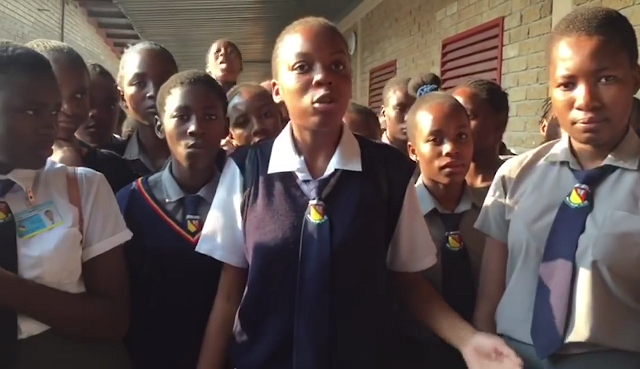Chalks have fallen - The namibian teachers strike 2016.
Pomwene
Shakela, Grade 12 learner: “Okay,
the thing is… We’re not saying that the government should not give the teachers
the 8% increment that they’re asking for, and neither are we saying that the
teachers should accept the 5% increment that government is offering. But, what
we’re saying is that they should fix their dispute, they should solve their
problems, but they should leave us out of it.”
Figure 1: Learners at Gabriel Taapopi Senior Secondary
School in Ongwediva.
An
impassioned and grammatically correct plea, against the backdrop of the first
legal teachers strike in Namibia’s history. Thousands of Grade 10, and Grade 12
learners turned up to school, only to find out that the examinations scheduled
for the 13th and 14th October had been postponed, because
there were no teachers to invigilate the exams. Chalks had fallen, the
educators were on strike.
After
failing to come to an agreement with the government on an appropriate
percentage for a long due salary increment, the teachers through their union
(Namibia National Teachers Union) voted for industrial action and put their
chalks down. Government, reactionary as always, chose to delay – resorting to a
last minute appeal in the High Court to interdict the strike. Two elephants had
decided to fight, and the grass was suffering.
Simeon Kavila, President of the Namibian National Teachers
Union (Nantu): “Our
demand is [for the strike] not to be politicised. It’s about bread and butter
issues. We’re teachers of this country and our actions are not politically
motivated. There is intimidation of our members on the ground and we condemn
this practice. We see it as intimidation… and it must be stopped without
further delay,”
Nantu
and the government had been locked in negotiations since April 2016. The
government offered a 5% salary increment for the financial year 2016/2017 and
an increment in housing allowance (8%) and transport allowance (7%), an offer
that other public servants had accepted through their union (Namibia Public
Workers Union – NAPWU). Government stated that 5% was what it could afford,
citing a dire financial situation due an economic downturn, and a crippling
drought.
Nantu
rejected the offer, citing that as inflation currently stood at over 6%, they
could not accept an increment below the inflation rate. Nantu instead requested
an 8% salary increment, in addition to the increment in housing allowance.
Negotiations had reached a deadlock, with claims of influence by third parties
and imperialist forces, the name calling and political mudsling had started.
With
no resolution in sight, Nantu sought a way forward from its electorate. The
teachers voted unanimously for the strike in September 2016, over 95% voted in
favour. The government retaliated with what the teachers viewed as a threat,
the prime minister issued a warning, “No work, no pay!” The lines had been
drawn, Nantu subsequently notified the government and gave them 24 hour notice,
the government sought to delay by seeking an extension on the notice period. It
became clear that the government was playing for time to avoid the External
Examinations for Grade 10 and 12 from being disrupted. Nantu issued their own
warning, as per rules set by the
conciliator, the strike would start
in 7 days. The smaller elephant was not backing down, the lines had been
drawn and the fight was on.
Katrina Hanse Himarwa, Minister of Basic Education, Arts,
and Culture: “Nantu must should know
where to start and where to end, and Nanso should know where to start and where
to End. Nantu has been recognised by the government as a bargaining agent,
Nantu must know where their mandate starts and where it ends. Nantu is not government,
and Nantu has not recognised the government, it is the government that has
recognised Nantu, and they should know that. ”
Considering
the “No work, no pay,” comments that the Prime Minister had issued earlier, the
writing was on the wall. The government made it clear to the teachers that the
gloves were off, and the scene was set for an epic showdown.
On
the morning of the 13th of October, Namibian teachers went on
strike. School was cancelled, and external exams were postponed. As teachers
picketed at their designated venues, Nantu and the government went back to the
negotiating table to find an amicable solution and hopefully end the strike.
 |
| "We want to write!" |
Pomwene
Shakela, Grade 12 learner: “They
should try to be considerate and put us first, because at the end of the day,
if we do not have accredited certificates then we won’t have an industrialised
nation. So, we want to write!”
Taking
a leaf from Pomwene’s book, it can’t be said that the teachers were
unreasonable. Their reasons to strike are valid, with conditions as they are,
teachers are struggling to put bread on the table. Neither can it be said that
the government’s reasons are invalid, the money simply isn’t there, but whose
fault is that really? No clear explanation was given on how this messed
occurred. No one stepped forward to present a sense of accountability for the
country’s financial predicament.
The
strike stopped being about money the minute that the government and especially
the minister of Education started undermining and intimidating teachers. It
then became about respect, teachers are vital components of producing
productive citizens, threatening them is tantamount to going against the current
government’s principle of ‘the Namibian
house’. If the concept of the Namibian house is going to work, then the
concerns of the electorate must finally be taken seriously and prioritised,
political office bearers are elected, so they must know that they are
accountable to the electorate.
The
innocent suffered, learners who had no part in it, they paid the price –
collateral damage. They now have to refocus and recalibrate their minds to
complete the most important exams of their lives. All of which could have been
avoided had the government prioritised the teachers concerns, even if the money
was not available, showing 20 000 thousand professionals a semblance of
respect instead of threatening them would have gone a far way in averting the
strike.
I’ll
close with a few wishful statements. If Abraham
Iiyambo were still alive and humbly asked teachers not to strike in the
interests of the learners, they would have listened – instead they received
taunts and threats. History will say that the strike only lasted two days, the
learners paid the price and it will give the impression that the teachers
gained more, but if lessons are not learnt, then will history will eventually
repeat itself. For now, sanity has prevailed the Namibian child has what they
wanted and is theirs by right – they can write their exams.
[The
Namibian teachers strike was called off after two days (13th – 15th
October 2016), the Union (Nantu) and the government agreed on a 5% increment
towards teachers’ salaries for 2016/2017 and a futher 9% increase for 2017/2018.
The minister and the Union still ain’t got no love for each other.]






Comments
Post a Comment